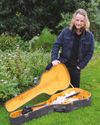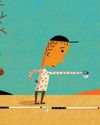Arnold Palmer's Impact On Golf Will Live Forever.

He looked like an athlete, a prizefighter, a middleweight. He opened golf’s windows and let in some air. He lifted a country club game, balanced it on his shoulders, carried it to the people, and made it a sport. He won big. He lost big. People who didn’t follow golf followed him. People who hated golf loved him. He was photogenic in the old newspapers. He was telegenic in the new medium. He was the most asked question called into the night desks on weekends: “What did Palmer do today?” From Pittsburgh, he was loamy meadows and smoky skies, river valleys and steel mills, like the plant where his father, Milfred, sometimes worked until just in front of the Depression, Milfred took a job as green keeper and pro (mostly green keeper) at Latrobe CC. Nobody addressed him as Milfred, except Doris when she was of a fanciful mind. To most, he was Deacon. A few said Deke. Arnold called him Pap.
From Pap, Arnie learned many important things, like how to grip a golf club and integrity. But Doris’ contribution was what made all the difference. She was as light and delicate as a scarf, but ready company and a natural communicator. She liked people, and they liked her. Deacon was always prodding his son to be tougher and try harder and succeed more. But whatever the boy did pleased his mother, provided he was kind.
Nobody had to teach him to love golf. As Peter Dobereiner wrote, “Arnold did not catch the golf bug; he was born with it like a hereditary disease.”
This story is from the December 2016 edition of Golf Digest South Africa.
Start your 7-day Magzter GOLD free trial to access thousands of curated premium stories, and 8,500+ magazines and newspapers.
Already a subscriber ? Sign In
This story is from the December 2016 edition of Golf Digest South Africa.
Start your 7-day Magzter GOLD free trial to access thousands of curated premium stories, and 8,500+ magazines and newspapers.
Already a subscriber? Sign In

Xtreme Bob
Tales of the Wild West, Pricey Clubs and Crazy Golf Games: Pxg Founder Bob Parsons Takes Gambles That Will Make You Sweat.

Swinging Goes With His Singing
The Voice SA winner Richard Stirton turns to golf when he needs to escape the demands of the entertainment industry.

Torchbearers
In Rio,These Golfers are playing for more than a Place in History.

Loudly South African
Olympic golfer Paula Reto has only played one tournament in South Africa, but remains proudly patriotic to her land of birth.

All In
After some Fragile Moments Jason Day turns inspiration into obsession.

By The Book
Four equipment-related rules you need to know

The Class Of 97
How Tiger’s 12-stroke Win 20 Years Ago Changed The Masters + Golf

Smash Hit
HOW TO GIVE IT EVERYTHING YOU’VE GOT

Split The Fairway!
GET THE MOST OUT OF YOUR DRIVER

Wise Guy
10 secrets to better golf by europe's top coach, pete cowen